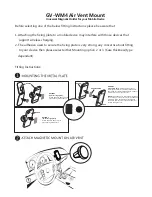
55
4. Safety precautions for direct sunlight
Keep this product away from excessive moisture and
extreme temperatures. Do not leave the product or its
battery inside a vehicle or in places where the
temperature may exceed 140°F (60°C), such as on a car
dashboard, window sill, or behind a glass that is
exposed to direct sunlight or strong ultraviolet light for
extended periods of time. This may damage the
product, overheat the battery, or pose a risk to the
vehicle.
5. Prevention of hearing loss
Permanent hearing loss may occur if
earphones or headphones are used at high
volume for prolonged periods of time.
6. Safety in aircraft
Due to the possible interference caused by this
product to an aircraft’s navigation system and its
communications network, using this device’s phone
function on board an airplane is against the law in
most countries. If you want to use this device when
on board an aircraft, remember to turn off your rf on
your phone by switching to Airplane Mode.
7. Environment restrictions
Do not use this product in gas stations, fuel depots,
chemical plants or where blasting operations are in
progress, or in potentially explosive atmospheres such
as fuelling areas, fuel storehouses, below deck on
boats, chemical plants, fuel or chemical transfer or
storage facilities, and areas where the air contains
chemicals or particles, such as grain, dust, or metal
powders. Please be aware that sparks in such areas
could cause an explosion or fire resulting in bodily
injury or even death.
8. Explosive atmospheres
When in any area with a potentially explosive
atmosphere or where flammable materials exist, the
product should be turned off and the user should obey
all signs and instructions. Sparks in such areas could
cause an explosion or fire resulting in bodily injury or
even death. Users are advised not to use the equipment
at refueling points such as service or gas stations, and are
reminded of the need to observe restrictions on the use of
radio equipment in fuel depots, chemical plants, or
where blasting operations are in progress. Areas with a
potentially explosive atmosphere are often, but not
always, clearly marked. These include fueling areas,
below deck on boats, fuel or chemical transfer or storage
facilities, and areas where the air contains chemicals or
particles, such as grain, dust, or metal powders.
9. Road safety
Full attention must be given to driving at all times in
order to reduce the risk of an accident. Using a phone
while driving (even with a hands free kit) causes
distraction and can lead to an accident. You must
comply with local laws and regulations restricting the
use of wireless devices while driving.
10. Safety precautions for RF exposure
• Avoid using your phone near metal structures (for
example, the steel frame of a building).







































